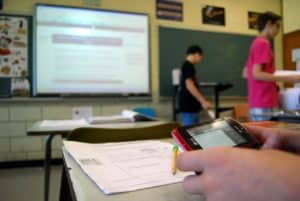
The advent of more portable technology has changed the rules of the game exponentially over the last two decades. Communication has never been easier – and, as a result, harder. As smartphones and texting become an invasive presence in the classroom, teachers are reaching out to help from one of the worst perpetrators: parents.
Joe Clement, a high school teacher in Virginia, has seen cell phones become an increasing problem both for teaching and for his students’ mental health. He’s also seen that parents will actively text their children while classes are running and they’ll be asking things that don’t put their young minds at ease. In light of this pressing problem, Clement is going the distance as a teacher to promote his students’ best interests.
Teachers want both students and parents to stop texting during class

WSAZ News Channel sites innocent questions like “Do you want chicken or hamburgers for dinner tonight?” as an interruption in the concentration required for quality education. It also lists queries like “What did you get on your test?” as ones that are just enough to impact a student’s mental health, keeping them from becoming fully and securely immersed in their education. Instead, it’s all about potentially dreading answering such a question.
RELATED: Hoda Kotb Gets Tearful Interviewing Teacher Determined To Be The Next Mister Rogers
Virginia school counselor Erin Rettig asserts that this kind of line of questioning causes anxiety, by asking for grade updates and their latest whereabouts. This in turn, Rettig says, impairs their sense of independence in the classroom.
“By texting back and forth with a parent, a child is unable to practice either self-calming or problem-solving skills,” argues Dr. Libby Milkovich, a developmental and behavioral pediatrician at Children’s Mercy Kansas City. “It’s easy to text, but if I don’t have a phone, I have to go ask the teacher or I have to figure it out on my own.”
How to address this problem now that smartphones are so ubiquitous

For all the new sources of stress smartphones have generated, their convenience has aided plenty of people in addressing a variety of needs. Students with anxiety may feel a sense of security being able to reach out to a trusted loved one during an overwhelming school day. Plus, sometimes family emergencies just warrant a steady line of communication.
But, asserts Mr. Milkovich, the benefits of keeping parents and students from texting in the classroom are important for the students. “Often parents say, ‘I want to be able to reach my child at any time,’ which has nothing to do with the child’s outcome,” said Dr. Milkovich, adding, “It’s because of the parents’ anxiety.”

Dr. Milkovich suggests gradually phasing out smartphones in a stepwise pattern so that there is no shock at the sudden change.
The big takeaways from this plan to keep parents and students from texting in the classroom involve gradually transitioning to a period of no – or limited – cellphone accessibility, during which time parents will refrain from texting their children and interrupting their productivity with anxiety. Students are also advised to turn off notifications; out of sight, out of mind, after all. If a child texts their parent with a non-urgent statement, experts advise parents to not reply, to better enforce the message. Finally, if there is a family emergency, relevant parties are encouraged to contact the front desk, who will pull the student from class as needed.
Do you agree with this system, or should cell phones be kept nearby?

